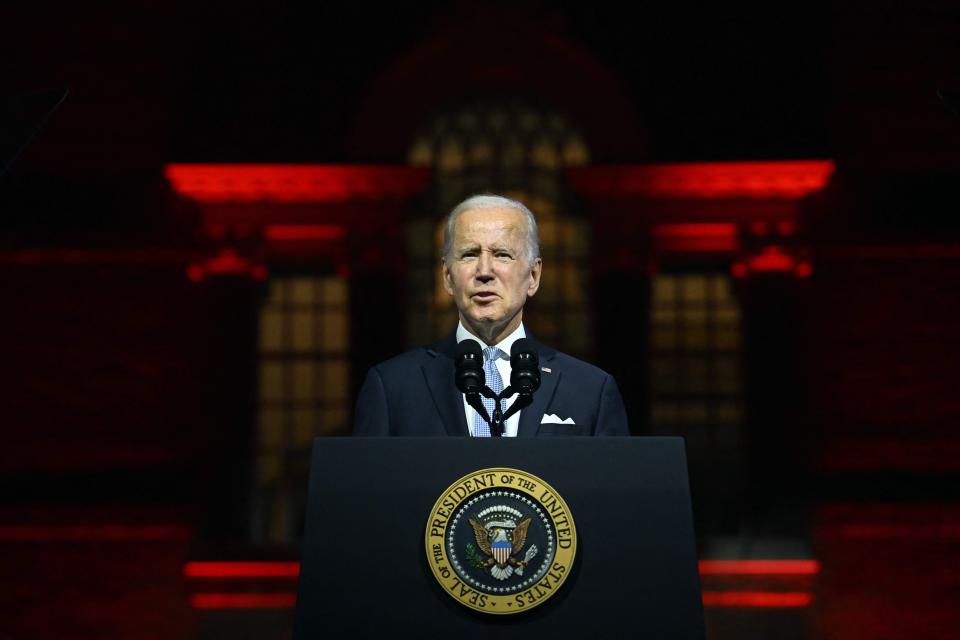Can you show respect to 'MAGA Republicans'? For sake of American democracy, we must try.
- Oops!Something went wrong.Please try again later.
- Oops!Something went wrong.Please try again later.
Predicated on a desire to counter “hate-fueled violence” and division in American society, President Joe Biden's United We Stand Summit produced meaningful moments in the service of unity last month at the White House.
Yet the event's proximity to the midterm elections and the president's at times divisive rhetoric underscore the dangers of politicizing unity itself.
Two weeks before the White House summit, Biden spoke in Philadelphia about threats to American democracy: “Democracy endures only if we the people respect the guardrails of the republic. Only if we the people accept the results of free and fair elections. Only if we the people see politics not as total war but mediation of our differences. Democracy cannot survive when one side believes there are only two outcomes to an election – either they win or they were cheated.”
'Battle for the soul of the nation'
Biden's speech was meant to summon Americans' conscience in the “continued battle for the soul of the nation.” With the use of such language, the president has cast the battle in metaphysical terms.
He isn’t wrong to do so. The union stands in a perilous moment. It is a moment in which the temptation to succumb to the worst impulses of rage and tribalism threatens to unravel the American project itself.
Opinions in your inbox: Get exclusive access to our columnists and the best of our columns every day
To heal America, we need a generosity and courage of spirit that is incompatible with the notion of “total war” in our politics. Biden recognizes that.
Yet, the president made it clear in the same speech that he believes there is an enemy in American politics that must be identified, rooted out and defeated. He even gave them a name: “MAGA Republicans.”
“Donald Trump and the MAGA Republicans represent an extremism that threatens the very foundations of our republic," Biden said. "MAGA Republicans do not respect the Constitution. They do not believe in the rule of law. They do not recognize the will of the people. … MAGA Republicans have made their choice. They embrace anger. They thrive on chaos. They live not in the light of truth but in the shadow of lies.”
To be sure, Biden faces a difficult political challenge. I share a visceral concern over the near future of democracy because of the willingness of former President Trump and his allies to bend the law and the truth in their efforts to undo the results of the 2020 election.
Biden’s words, however, make it easy for Republicans in general and Trump voters in particular to feel they are the personal targets of the president's moral outrage and to fear possible consequences from the Biden administration in this polarized age.

Republican pundits and politicians wasted no time in capitalizing on this fear. Ben Shapiro, a popular commentator who usually shows integrity, characterized Biden’s MAGA Republican rhetoric in terms that veered toward intellectual dishonesty. Shapiro accused the president of labeling “half the American public the enemy,” and of giving “a vicious speech targeting half of Americans.”
Yet, Biden clearly insisted that he was talking about a faction in the GOP: “Now I want to be very clear – very clear up front – not every Republican, not even the majority of Republicans, are MAGA Republicans. Not every Republican embraces their extreme ideology. I know, because I’ve been able to work with these mainstream Republicans.”
USA TODAY Opinion series on the Future of Conservatism: Republicans must move past Trump for sake of the party's future – and the nation's
In my work with Braver Angels and other organizations focused on depolarizing discourse, we have begun to see liberals differentiating between “MAGA Republicans” and reasonable Republicans in drawing the lines with respect to whom they're willing to associate with.
Even so, a firm challenge to the irresponsibility of Biden’s words is justified. It is not good that Americans become comfortable with isolating and excoriating so-called MAGA Republicans, as if doing so is a recipe for changing minds, depolarizing our politics and restoring confidence in the electoral process and the institutions of our democracy.
Seeking to win opponent's friendship
To the contrary, such a response is an accelerant on the road to the sort of social dissolution that portends more violence and the crumbling of the institutional structures of the republic.
There is another way. It is the path of philosophical nonviolence as practiced in action and rhetoric by Martin Luther King Jr., Bayard Rustin and the innovators in the American civil rights movement. It is a philosophy that rests on the conviction that we must, in King’s words, “not seek to defeat or humiliate the opponent, but to win his friendship and understanding.”
Incredible examples of this sort of moral courage and power of spirit were displayed in the White House’s United We Stand Summit. In particular, these qualities shone in a powerful panel of survivors – including Dawn Collins, an African American woman whose son Richard was murdered in a racist attack at the University of Maryland; Vilma Kari, an Asian woman who was beaten for reasons of prejudice in New York City; Rais Bhuiyan, a Bangladeshi man who was severely wounded in an attempted murder in Dallas after Sept. 11, 2001; Joseph Borgen, victim of an antisemitic beating by a group in New York; Pardeep Kaleka of the Forgiveness Project, who lost family and friends in the Sikh temple massacre in Wisconsin, in 2012; and Mayra Alvear, whose daughter was murdered in the Pulse nightclub shooting in Orlando in 2016.
Each of these individuals experienced unfathomable loss. Yet each of them chose to humanize those who had hated and harmed them. They chose the path of forgiveness, reconciliation (where it was possible) and grace.
Each of their stories is worth recounting, but I will focus on one: Rais Bhuiyan came to America as an optimistic immigrant who was educated, accomplished and eager to build a life for himself in the ruggedly independent landscape of Texas, a place that fascinated him after years of watching American Westerns. But Bhuiyan was caught in the wave of anti-Islamic hatred that spread after 9/11. One day while he was working in a relative’s convenience store, a man came in with a double-barrel shotgun and asked where he was from.
Although Bhuiyan begged for his life, the man shot him at point blank range, leaving him for dead on the floor. He was rushed to a hospital in time for his life to be saved. But he lost sight in his right eye and underwent multiple surgeries. He also lost his business, his fiancé and his psychological and emotional security as medical bills piled into the tens of thousands of dollars with little help in sight.
Nevertheless, Bhuiyan’s faith sustained him. While his attacker, who killed two other people, awaited his fate on death row, Bhuiyan made a religious pilgrimage to Mecca. Feeling himself transformed, he embraced the cause of forgiveness and launched a public campaign to spare the life of his would-be murderer. When the effort came to his assailant's attention, they had the opportunity for a phone call.
“I began to see him as a human being, too, not just a killer. I saw him as a victim, too," Bhuiyan said at the White House summit. “Before he pulled the trigger, he saw me as less than human, a threat. But when he got to know me, he called me brother … and he renounced his hateful views.”
Opinion alerts: Get columns from your favorite columnists + expert analysis on top issues, delivered straight to your device through the USA TODAY app. Don't have the app? Download it for free from your app store.
Bhuiyan then offered this wisdom to the audience: “What I want from people is that – that people will find ways to treat each other as humans first. … And I want people to stand up against human suffering, regardless of the victims.”
Bhuiyan’s attacker was eventually executed, but he also was transformed by Bhuiyan’s extraordinary compassion. He told Bhuiyan that he loved him. He thanked the Muslim community for their outpouring of support.
And when Bhuiyan eventually met his attacker's children, he said to them, “You lost a father, but you’ve gained an uncle.”

I am not comparing MAGA Republicans to those who commit hate-fueled violence. Rather, I want to remind Americans of the superior power of nonviolence in its capacity to transform enemies into friends. It is not by dehumanizing but re-humanizing one another in each other’s eyes that we can begin to mend the wounds of our democracy.
To win the battle for the soul of America, we must begin the work inside our own hearts and minds.
John Wood Jr. is a columnist for USA TODAY Opinion. He is national ambassador for Braver Angels, a former nominee for Congress, former vice chairman of the Republican Party of Los Angeles County, musical artist, and a noted writer and speaker on subjects including racial and political reconciliation. Follow him on Twitter: @JohnRWoodJr
More from John Wood Jr.:
Red and blue America don't trust each other. And that's driving us dangerously apart.
Dinesh D'Souza serves misinformation about 2020 election to gullible conservatives.
White privilege may be real, but economic class is a bigger factor in driving inequality.
You can read diverse opinions from our Board of Contributors and other writers on the Opinion front page, on Twitter @usatodayopinion and in our daily Opinion newsletter. To respond to a column, submit a comment to letters@usatoday.com.
This article originally appeared on USA TODAY: Biden targeting 'MAGA Republicans' is not how we will save democracy

